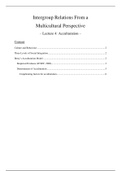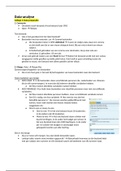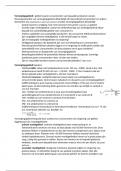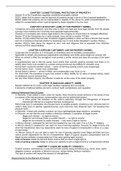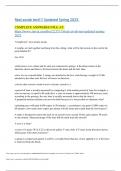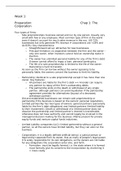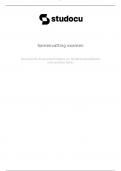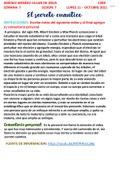Samenvatting Daniel Miller – Stuff
0. Prologue: My Life as an Extremist
There is no clear definition of stuff or material culture.
o The study of stuff borders on many disciplines while it should be one of its own.
Central argument is a paradox: the best way to understand, convey and appreciate our
humanity is through attention to our fundamental materiality.
o Non-industrial societies are just as much material cultures as Western society.
o It challenges the opposition between the person and the thing, the animate and the
inanimate, the subject and the object.
o It is concerned with anthropology’s qualitative encounter of a diversity of things.
o It does not try to oppose itself to stuff, the pure humanity is not tainted by stuff.
Instead, persons are stuff as well: use of and identification with a material culture provides a
capacity for enhancing and submerging our humanity.
o More profound appreciation of things will lead to more appreciation of persons.
There is a growth in both particularity and universality going on in the modern world.
o How should academics respond to this condition? By looking for the middle ground?
o No, the problem is that universalism and particularity can easily lose their connection.
Anthropology brings these back in the conversation and look for mutual acknowledgement.
o No discipline is more dedicated to particularity than the relativism of anthropology.
o Yet anthropology also looks for a level of universality that transcends particularities.
It looks for a connection between the extremes of both, restoring the link between them.
Anthropologist: someone who seeks to demonstrate the consequences of the universal for the
particular and of the particular for the universal by equal devotion to empathetic
understanding and encompassment of both.
1. Why Clothing is not Superficial
Semiotics: objects are signs and symbols that represent us, they make up unspoken
communication and express who we are and what we do.
However, what and where is the Self that the clothes represent?
o Clothes can indeed represent us, but they can also lie about us.
o Clothes are not superficial, they are what makes us what we think we are.
Trinidad
The problem with viewing clothes as the surface that represents, or fails to represent, the
inner core of true being is that we are then inclined to consider people who take clothes
seriously as themselves superficial.
o This goes against anthropology’s task to enquire empathetically about others.
Fashion: the collective following of a trend.
Style: the individual construction of an aesthetic based on what you wear and how you wear it.
Ex.: in Trinidad squatters own many fashionable clothes, and love showing them (Trinidad style)
o Individualism: you can copy, but re-combine your own elements
o Transience: clothing is short-lived, you can’t accumulate, you move on.
o Why would this devotion to clothing be problematic or superficiality?
We have depth ontology: our “being” is inside ourselves, in direct opposition to the surface.
o The core of the Self is constant and doesn’t change or respond to circumstance.
o Trinidad don’t want to interiorize however, they out themselves to block misfortunes.
By keeping things on the surface they have the freedom to construct oneself,
instead of being categorized by circumstance.
0. Prologue: My Life as an Extremist
There is no clear definition of stuff or material culture.
o The study of stuff borders on many disciplines while it should be one of its own.
Central argument is a paradox: the best way to understand, convey and appreciate our
humanity is through attention to our fundamental materiality.
o Non-industrial societies are just as much material cultures as Western society.
o It challenges the opposition between the person and the thing, the animate and the
inanimate, the subject and the object.
o It is concerned with anthropology’s qualitative encounter of a diversity of things.
o It does not try to oppose itself to stuff, the pure humanity is not tainted by stuff.
Instead, persons are stuff as well: use of and identification with a material culture provides a
capacity for enhancing and submerging our humanity.
o More profound appreciation of things will lead to more appreciation of persons.
There is a growth in both particularity and universality going on in the modern world.
o How should academics respond to this condition? By looking for the middle ground?
o No, the problem is that universalism and particularity can easily lose their connection.
Anthropology brings these back in the conversation and look for mutual acknowledgement.
o No discipline is more dedicated to particularity than the relativism of anthropology.
o Yet anthropology also looks for a level of universality that transcends particularities.
It looks for a connection between the extremes of both, restoring the link between them.
Anthropologist: someone who seeks to demonstrate the consequences of the universal for the
particular and of the particular for the universal by equal devotion to empathetic
understanding and encompassment of both.
1. Why Clothing is not Superficial
Semiotics: objects are signs and symbols that represent us, they make up unspoken
communication and express who we are and what we do.
However, what and where is the Self that the clothes represent?
o Clothes can indeed represent us, but they can also lie about us.
o Clothes are not superficial, they are what makes us what we think we are.
Trinidad
The problem with viewing clothes as the surface that represents, or fails to represent, the
inner core of true being is that we are then inclined to consider people who take clothes
seriously as themselves superficial.
o This goes against anthropology’s task to enquire empathetically about others.
Fashion: the collective following of a trend.
Style: the individual construction of an aesthetic based on what you wear and how you wear it.
Ex.: in Trinidad squatters own many fashionable clothes, and love showing them (Trinidad style)
o Individualism: you can copy, but re-combine your own elements
o Transience: clothing is short-lived, you can’t accumulate, you move on.
o Why would this devotion to clothing be problematic or superficiality?
We have depth ontology: our “being” is inside ourselves, in direct opposition to the surface.
o The core of the Self is constant and doesn’t change or respond to circumstance.
o Trinidad don’t want to interiorize however, they out themselves to block misfortunes.
By keeping things on the surface they have the freedom to construct oneself,
instead of being categorized by circumstance.


